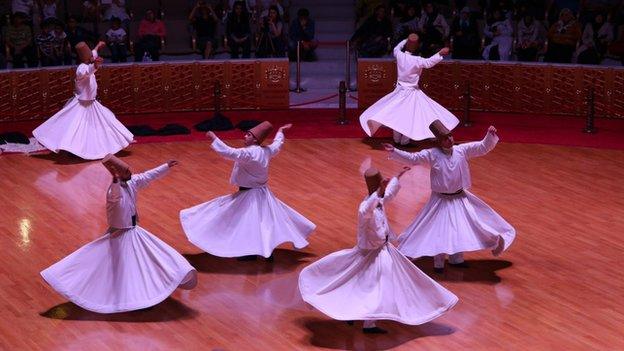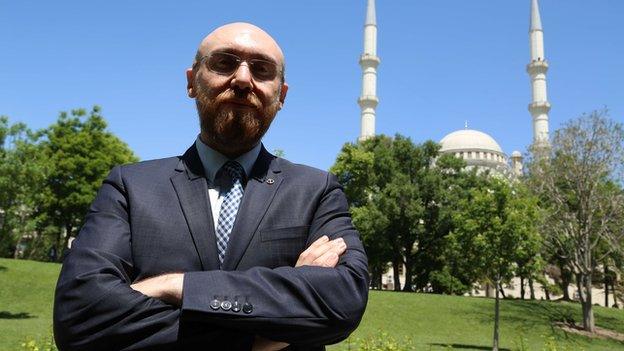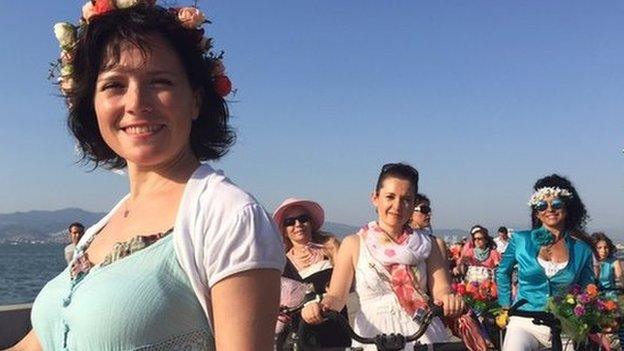Turkey's religious heartland enjoys AKP prosperity
- Published

Konya is home to the famous Sufi dancing practice of the Whirling Dervishes
It zips through the Turkish countryside at 250 kilometres an hour: fast, efficient - and a vote-winner for the governing AK Party (AKP).
We've boarded Turkey's high-speed train as we continue our election trip across the country. It's still new - this is only the second line, connecting Ankara to once sleepy Konya. It's cut what was a 16-hour train ride via another town down to just 1 hour 45 minutes.
The railway is a pet project of the government, intended to be an engine of growth for Turkey's economy - and for Konya itself.
"I'm very proud of this train", says Yavuz Ozden, commuting to his hometown. "Our people support the AKP because of it. They produce things; they have a vision. We always dreamt of a railway like this - and now it's happened."
Turkey's 'bread basket'
Grand infrastructure projects have been a hallmark of the AKP's 12 years in government. Roads and airports have multiplied, as the government pinned its fortune on Turkey's development.
Coming to power after a financial crash in 2001 and a huge IMF loan, Turkey now boasts the world's 17th largest economy.
Mark Lowen asks if Turkey's fast trains will be a vote winner for the governing AK Party
Annual growth hit 9% in 2010 - but has since slowed rapidly, to under 3% last year. Financial jitters are creeping back - but in Konya, the worries seem far away.
This previously agricultural city, known as Turkey's "bread basket", is soaring. Exports have risen 10 times in the past decade.
Mystical order
It is also one of Turkey's most conservative, religious cities, teeming with mosques: a world away from our first election stop, Izmir.
The Whirling Dervishes - the dance of the mystical Islamic order of Sufism - were born here eight centuries ago, still drawing the crowds to a weekly performance.
Both aspects - rapid economic growth and the profoundly religious character - have made it a stronghold of the Islamist-rooted AKP. In the last election, the party won its highest share of the vote here.
At the Konya Seker food factory, they're reaping the benefits. I'm shown the chocolate-making area, cutting-edge machinery moulding sweets before they're wrapped in multi-coloured foil.
Have the AK Party's policies sweetened voters? Mark Lowen reports from a chocolate factory
Next door, biscuits are produced. Down the road, it's dairy products and potatoes. Waste is converted into biogas in another of its factories. Tomatoes are grown nearby. The list goes on.
"The business climate here has totally changed in the past decade," says chairman Recep Konuk. "We used to be seen [by the old secular regime] as Anatolian outcasts; we were branded 'Islamic capitalists'. But the AKP has shown that with ambition and effort we can succeed."
Konya Seker has built 33 new factories since 2004, its workforce increasing from 900 to 11,000. Its parent company is now among the 20 largest in Turkey. Keen to benefit from the economic rise, Mr Konuk is running as an MP for the AKP.
'Treated like dogs'
I join him on the campaign trail in the nearby town of Karaman. He tells me he intends to remain in his company if - and when - he's elected. The concept of conflict of interest is not really considered in Turkish politics.
He's warmly received at the local market, sellers of shoes and headscarves crowding around him as he stops for tea.
This religious side of Turkey felt isolated by previous governments, which adhered to the secular constitution. But the AKP has allowed religion to pervade politics - and its voters say this has given them a voice.


Konya is the latest stop on Mark's tour around Turkey ahead of the election. Follow the journey #bbcturkey15

"Before, at hospitals, we were treated like dogs," says Ayse Derman, "but when the AKP came, we were given respect, seen as human beings".
Konya is now labelled an "Anatolian tiger", a term also used for the Islamic small businesses whose owners have become the backbone of AKP support. One, Murat Ozsandikci, runs a machinery company.
"We feel empowered by this government; we feel we own this country more," he tells me.

Small business owners like Murat Ozsandikci say their voices are being heard under the AKP
"Today I can go to a shopping mall or a five star hotel and ask for a prayer room. Before, we weren't asked our opinion. Now we don't feel pressure to look or think in a different way. It's not an issue anymore."
Devotion to AKP
Criticism of Turkey's government - and especially the divisive President Recep Tayyip Erdogan - has exploded in recent years.
Declining freedom of speech, the lack of an independent judiciary and growing authoritarianism are frequently cited by opponents within Turkey and the West, with which relations have soured.
But it's only by spending time in a city like Konya that you recognise the depth of devotion that the AKP inspires.
For its supporters, the anti-government protests of 2013, the clampdown on social media or the stormy corruption scandals almost don't register.
Their AKP is the party that allowed girls in headscarves to study, that built them hospitals, schools and motorways - and they wouldn't dream of voting for anyone else.
Follow the BBC News journey around Turkey ahead of the election using the hashtag #bbcturkey15, external.
- Published22 May 2015

- Published22 August 2023
